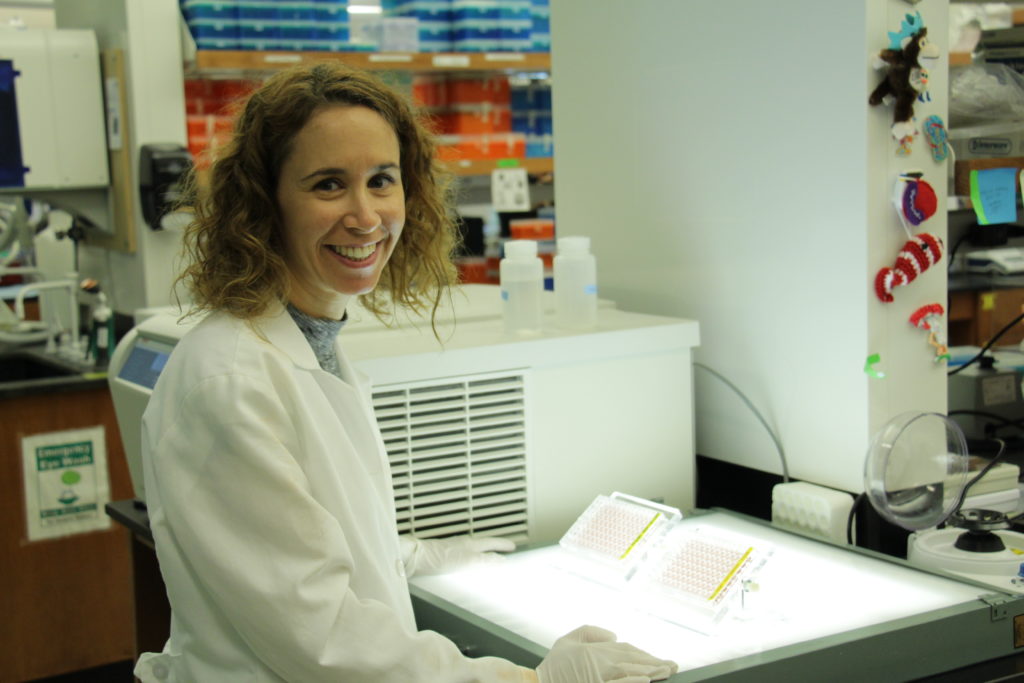Trainee Spotlight: Anat Florentin

Anat Florentin, a post-doctoral associate in Vasant Muralidharan‘s laboratory, is originally from Israel. She received her BSc degree from Tel-Aviv University and MSc from the Weizmann Institute of Science. She obtained her Ph.D. also from the Weizmann Institute where she studied programmed cell death mechanisms using the fruit fly as a model organism. Dr. Florentin moved to the United States 4 years ago when she joined the Muralidharan Research Group. During her time at UGA, she has received a number of awards in recognition of her research:
- American Heart Association Postdoctoral Fellowship (2018-2020)
- Postdoctoral Research Award, UGA Office of Research (2018)
- Foreign travel award, UGA Office of Research (2018)
- Best Poster Presentation award at the UGA GSPS Research Day (2016)
- Best Postdoctoral Poster award at the 2015 UGA Conference on Drug Discovery (2015)
Why did you choose UGA?
Since my background is in basic cell biology and genetics, I knew very little of the biology of parasites but was determined to study malaria. While I was looking into different places in Europe and the US, I met with another Israeli, Lilach Sheiner who, at the time, was doing her postdoctoral training with Dr. Boris Striepen at UGA. She told me very good things of CTEGD and of a great newly recruited faculty who studies malaria. I came for a visit, and was impressed by the engaging scientific community, the super friendly atmosphere and the variety of different parasites and approaches to study tropical neglected diseases. I am so glad I made this decision!
What is your research focus/project and why are you interested in the topic?
The goal of my research is to understand the unique cell biology of malaria parasites and to identify potential drug targets. In order to do that I develop and apply genetic and molecular tools that are used to manipulate the genome of the parasite. During my years in the lab I was involved in several projects; One of them studies mechanisms by which the parasite transports proteins into the host red blood cell. Another interesting project focuses on a conserved complex from bacterial origin that resides within a unique parasite organelle called the apicoplast. Lastly, I am looking for genes that might be involved in programmed cell death processes in the parasites.
What are your future professional plans?
I want to establish my own research lab, conduct independent research and train the next generation of future scientists.
Have you done any field work or is there a collaborator/field site that you would like to visit in order to enhance your training?
Although we use field samples in our studies, I have never been to any field site, and would absolutely love to visit one. I am positive it will enhance my training and will add another layer to the work that I am doing. I am sure that visiting any field site in a malaria endemic area, such as Africa or Southeast Asia would be an enriching experience that would underline the significance of our work.
What is your favorite thing about UGA and Athens, GA?
Many things… At CTEGD I cherish the collaborative atmosphere, the variety of parasitism-related topics, the strong basic science that goes together with field studies and translational research. I am highly appreciative of the fact that I have access to a huge amount of knowledge by working side by side with top experts in these fields.
Athens is also great. Moving here in 2014 with a family of 2 young kids couldn’t go smoother! We found here a great community of friends, great public schools, and amazing nature. I love the mountains, the trees and the wildlife around us!
Any advice for students interested in this field?
There is still so much to do and learn in the field of parasitology and every discovery that you make may impact the life of the millions that suffer from these diseases. Don’t hesitate if you don’t know much about parasites. No matter what your background is, you can use the tools and knowledge that you acquired and apply them to this challenging but rewarding research!
Your financial gift to the CTEGD Fund helps provide field research opportunities to trainees like Anat Florentin through The CTEGD Training Innovations in Parasitological Studies Fellowship.
[button size=’large’ style=” text=’Give Today’ icon=” icon_color=” link=’https://gail.uga.edu/commit?cat=campus&subcat=research&des=91700000′ target=’_self’ color=” hover_color=” border_color=” hover_border_color=” background_color=” hover_background_color=” font_style=” font_weight=” text_align=’center’ margin=”]
